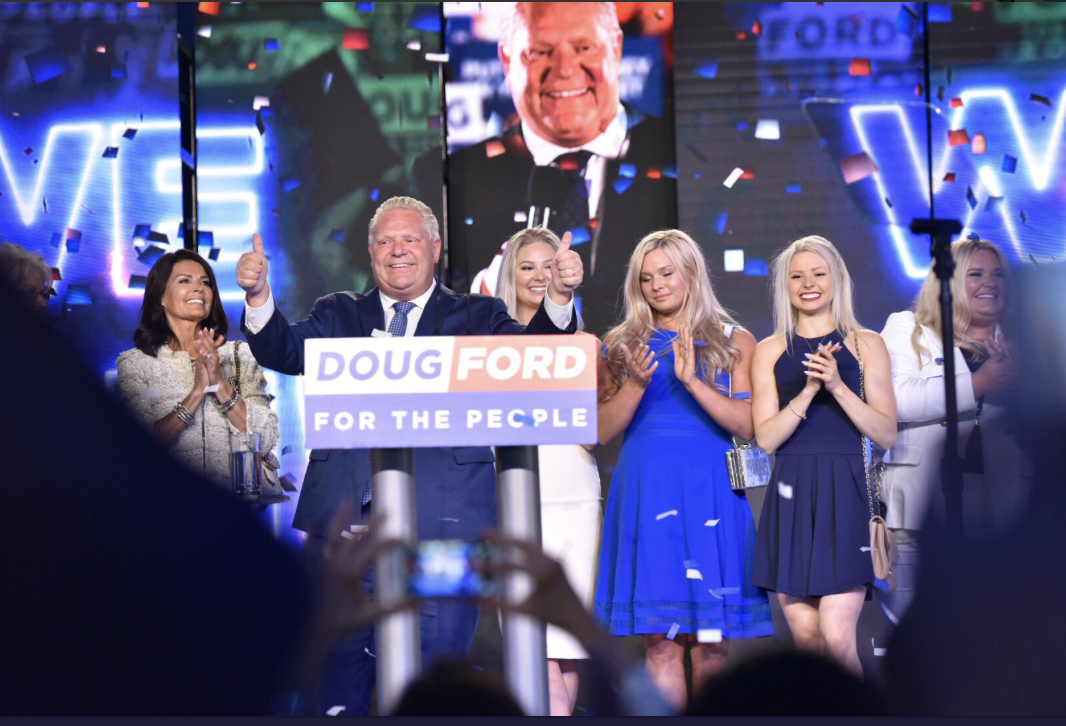Doug Ford’s victory for the Ontario Progressive Conservatives (PCs) on Thursday, June 7, was bigger, in popular vote terms, than most polls predicted. It will be hard to dismiss the legitimacy of this victory. But it is only par for the course under our electoral system.
The PCs got close to 41 per cent of the votes, giving them 76 seats. The New Democrats won about 34 per cent of the vote, giving them 40 seats. The Liberals got a bit less than 20 per cent, which gives them only 7 seats. The Greens took one seat.
It is a cruel result for the Liberals. Their leader, Kathleen Wynne, has resigned. Those in Wynne’s party who preferred this result to an NDP victory will now be put to the test. Can they rise from these ruins and challenge for government again?
Meanwhile, Ford has pretty much unchecked power for four years. Do the Wynne Liberals now think it was a good idea to vehemently attack the New Democrats, accusing them of being hapless and doctrinaire stooges for organized labour, just to save themselves a tiny handful of seats?
Early on election night, the CBC’s Rosemary Barton mused that when, late in the campaign, Wynne decided to admit she would not prevail, she might have had a more significant impact had she made a different sort of recommendation to Liberal supporters. Wynne could have said, clearly, that if voters were not so sure about voting Liberal they should choose the other progressive option, which would not have been Ford’s party.
It is unrealistic, perhaps, to think an additional six or seven per cent of Liberal votes would ever switch to the NDP. There may be too much historic bad blood between the two parties. Looking at the results, however, it is hard not to notice that there are many seats where NDP and Liberal votes combined exceed those for the Conservatives. Doug Ford has a big and healthy majority, despite the fact that close to six out of 10 Ontarians rejected him and his party. The New Democrats and Liberals combined won about 54 per cent of the vote, more than half. Then, there are the Greens, who elected their first member in leader Mike Shreiner. They got close to five per cent.
That is how our system works. And so, we in Ontario are all in Ford Nation now, even if many of us feel like unwilling hostages.
Standing up for those who voted against cuts, i.e., everybody
Ford’s acceptance speech was predictably vacuous. Its most notable feature was that the PC leader started speaking while the outgoing premier was still giving her concession speech. That is not good form. But the Fords have never been ones to stand on ceremony.
The only election promises to which Ford alluded in his speech were to lower taxes and gasoline prices. He did not say how he is going to make up for the lost revenue from those tax cuts. He has already promised not to fire a single teacher or nurse — or any other public servant.
New Democratic leader Andrea Horwath did not display the chagrin and deep disappointment many who supported her are feeling. Ontario now has a leader who seems almost uniquely ill equipped for the job, and who has too often behaved like a thug. That worries a good many Ontarians who put their faith in Horwath. But the NDP leader herself is, publicly at least, rejoicing in the second best result ever for her party. The best result was Bob Rae’s majority victory in 1990, with only 37 per cent of the popular vote.
In her speech, Horwath promised to stand up for the millions of Ontarians who did not vote for cuts to jobs and crucial services such as health care. Indeed, since Ford promised no cuts to jobs and services, and, in fact, pledged to increase investments in health care, we have to assume that the only Ontarians who voted for cuts of any kind are the handful who voted Libertarian. When the Conservative fantasy platform confronts reality we could be headed for some pretty stormy times.
And so the scary part of this victory is not just Ford’s unpredictable, Trump-like personality. It is the fact that we really have no idea what he has in mind, and nor, it seems, does he. To the extent the PC leader has committed to any program or policies they are not fiscally sustainable. Ford’s contradictory promises do stand up to even the most cursory scrutiny. Never before has a party won an election based on such vagueness and lack of detail.
A reporter once asked Harold Macmillan, who was British prime minister during the late 1950s and early 1960s, what factors would determine the actions of his government. He answered: “Events, my dear man, events.”
Doug Ford will very soon discover the truth of that dictum.
Photo: Doug Ford/Twitter
Like this article? Please chip in to keep stories like these coming.





